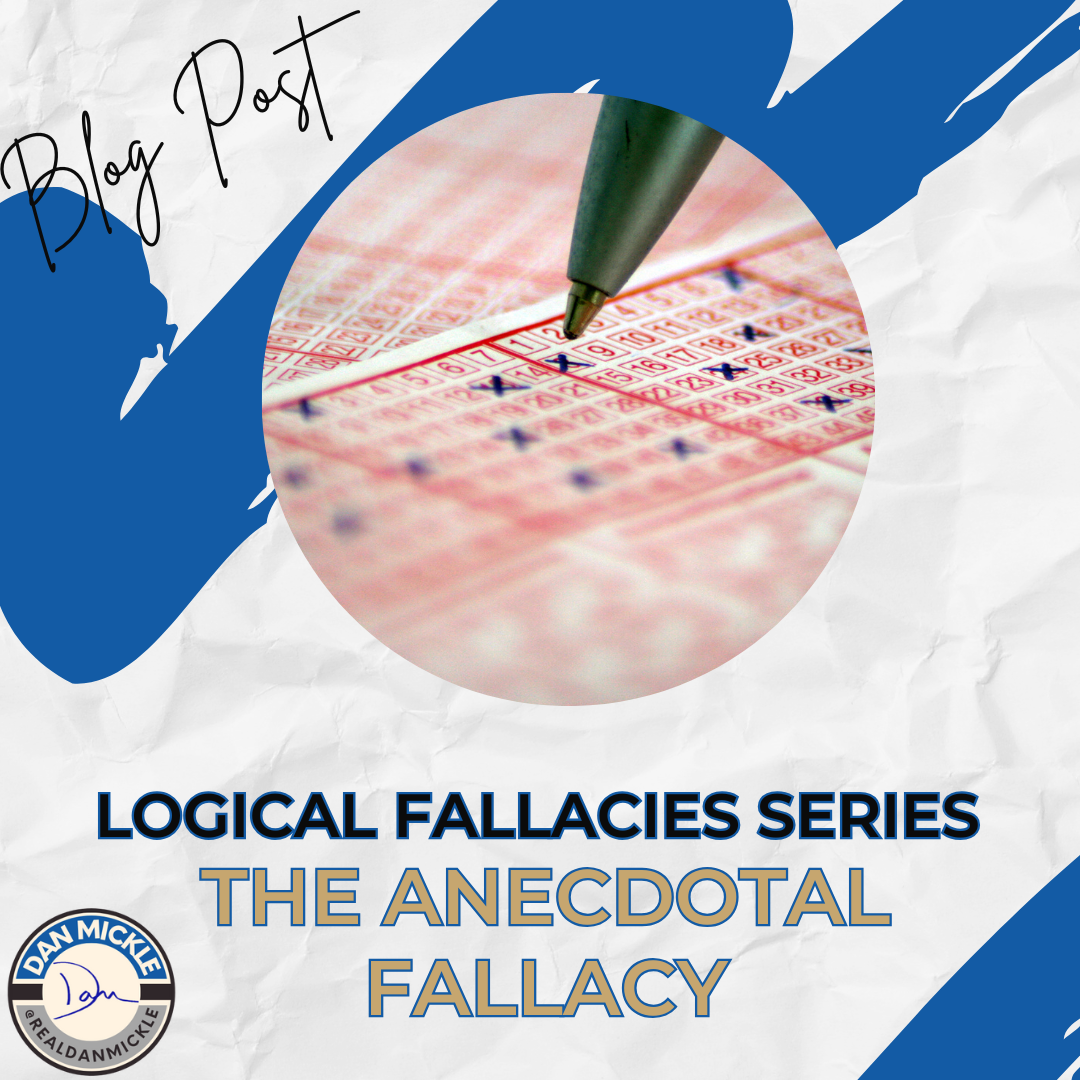Anecdotes Aren’t Evidence
A Logical Fallacies in Youth Sports Blog Series Post
This post is part of our ongoing series on logical fallacies and how they sneak into youth sports thinking, often dressed in warm-up gear and clutching a protein shake. Today’s topic: the anecdotal fallacy—a common trap where personal stories are mistaken for universal truths. If you’ve ever made a decision in youth sports based on what happened “that one time,” you’ve likely bumped into this fallacy.
Understanding the Anecdotal Fallacy
The anecdotal fallacy is when someone uses a personal experience—or someone else’s—to argue against solid data or a larger trend. You’ve definitely heard this one in the wild:
“My cousin never stretched a day in his life and never got hurt. So I don’t think kids need warm-ups.”
“We didn’t even train serve receive when I played, and we won everything.”
“My daughter got recruited straight from one tournament. Highlight reels are pointless.”
We love stories. Our brains are wired for them. But when stories get mistaken for strategy or science, we run into trouble. Just because something happened one time doesn’t mean it’s repeatable, replicable, or even wise.
That’s the anecdotal fallacy in a nutshell.
How the Anecdotal Fallacy Shows Up in Youth Sports
Youth sports practically runs on anecdotal fuel. Parents tell other parents what “worked” for their kid. Coaches rely on that one time they went undefeated in 2009. Players cling to stories about a college coach who “discovered” someone on TikTok. Administrators base entire systems on what someone once told them at a regional banquet.
It’s everywhere. And it’s a problem.
Let’s break down some classics.
Parenting and the Anecdotal Fallacy
One of the most common forms of anecdotal fallacy is parenting advice masquerading as universal truth.
A parent might say, “We skipped club ball and just went to open gyms. Now she’s a starter on varsity.” That’s awesome for them. But if you’re offering that as general recruiting or development advice, you’re skipping a few chapters (and data sets). You don’t know if their kid’s path would work for someone else, or even if it worked because of or in spite of those choices.
Coaching by Anecdote
Ah yes, the coaching version. “Back in 2015, we stopped doing conditioning and we had our best season ever.” One successful season doesn’t negate what we know about the role of fitness, injury prevention, and team discipline. That’s correlation, not causation.
This fallacy often leads to coaches locking in “systems” based on one team that happened to gel, had senior leadership, or just got lucky with bracket draws. Then they apply that same plan to every team for the next decade.
Recruiting Tales and Myths
This one’s the spiritual cousin of the urban legend. “I knew a kid who got a full ride to a D1 school and never even played club.” Or, “There’s this player who got recruited off Instagram clips alone.”
Maybe that happened. Maybe it didn’t. Either way, it’s not the norm. And it’s not a plan. It’s a story. We confuse what’s possible with what’s probable, and that mistake leads to a lot of misguided choices.
If you’re looking for recruiting facts over fiction, USA Volleyball’s The Ins and Outs of Camps, Combines and Other Summer Events is a great read!
Why the Anecdotal Fallacy Is So Tempting
It’s simple: stories are easier to remember than stats. If I tell you that 82% of athletes who complete injury-prevention programs report lower overuse injuries, you’ll nod and forget it. But if I tell you about a girl who skipped the program and tore her ACL in preseason, you’ll remember that. That’s how our brains work.
We’re emotional creatures trying to survive in a rational world. And sometimes, “I know a guy” feels more trustworthy than, “Here’s a peer-reviewed journal article.” But that’s how mistakes get baked into systems.
How to Avoid the Anecdotal Fallacy
You don’t need to stop telling stories. In fact, stories are often how we connect, inspire, and humanize this whole youth sports journey. The trick is recognizing when a story is just that—a story—not a rule.
Start asking a few simple questions:
-
Does this example reflect a consistent pattern, or is it just a one-off?
-
What’s the data say?
-
Is this advice repeatable across different teams, settings, or athletes?
-
Could the outcome have been coincidence or even luck?
And maybe most importantly: Who benefits if I believe this anecdote as gospel?
If someone’s telling you, “My son did this and now he’s committed,” but they happen to run a training program that offers exactly that path, well, maybe take it with a grain of protein powder.
Why It Matters in the Big Picture
Believing in exceptions makes it harder to follow evidence. And when you build training plans, development models, or even recruiting timelines around outliers, you’re rolling dice with an athlete’s future.
If every decision your club makes is based on “a team we had once,” and every strategy a parent uses is built around “what worked for my older kid,” you’re creating a blueprint with missing pages. At best, it’s ineffective. At worst, it’s damaging.
You want athletes to thrive? Make decisions rooted in patterns, principles, and performance—not personal mythology.
Fix the Thinking, Not Just the Talking
Correcting the anecdotal fallacy isn’t just about changing what people say. It’s about shifting how we evaluate truth.
That might mean challenging a coach who clings to “what worked for us once.” It might mean helping a parent understand that just because their kid didn’t burn out on triple practice days doesn’t mean it’s healthy for everyone. It definitely means encouraging athletes to look beyond viral stories of success and start building habits that lead to long-term improvement.
If this resonates, revisit our Gambler’s Fallacy in Youth Sports, which breaks down how randomness can make even smart decisions feel off base. It’s a great companion piece to this one.
Recap and Takeaway
-
The anecdotal fallacy confuses personal stories with reliable evidence
-
It’s rampant in youth sports: from recruiting to training decisions
-
We need to ask better questions and ground our choices in patterns, not exceptions
-
One story is not a system. One outcome is not a strategy
-
Want athletes to succeed? Build off data, not “I knew a kid once”
Up Next
Stay tuned for the next post in our Logical Fallacies in Youth Sports series, where we’ll explore the Appeal to Authority, and how trusting the loudest voice in the room can lead us down the wrong sideline. Until then, remember: stories inspire, but evidence guides.


